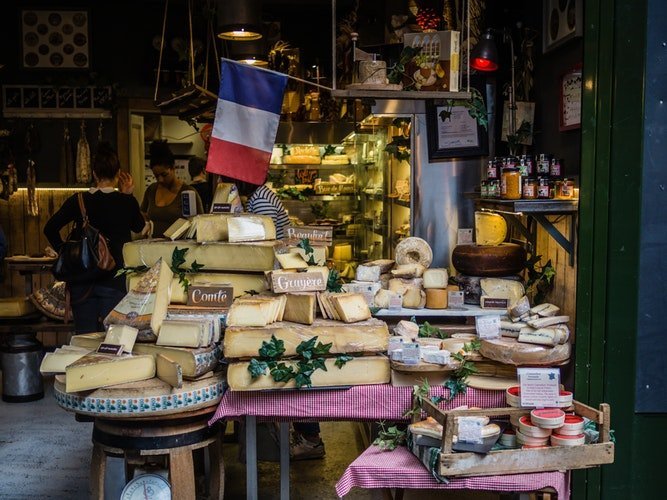Cheese adds delicious flavors to foods, and it’s a good appetizer, as well. But other people do not like cheese because it smells. Well, not all kinds of cheese, but there are some which tend to be more stinky than others.
All cheeses are made the same way. The milk is heated to kill any harmful bacteria it might contain, then it is transferred to a large container. Then, a starter culture of special bacteria is added to it. These bacteria are responsible for breaking down the sugar in the milk which is called lactose, into lactic acid. After that, rennet is added. Rennet is an extract used to curdle milk for the processing of cheese. It contains an enzyme called casein that makes proteins in the milk coagulate or thicken. It makes the milk separate into curds or solids and whey or liquid. When the solid curds are formed, they will be cut into smaller pieces to release more liquid. Then, it is heated to release even more whey. This process is called syneresis.
After that, the whey will be drained, leaving behind the curds. The curds will then begin to clump together. This process is called cheddaring. Sometimes salt is added to remove excess moisture and to improve the taste, as well. Then, the salted curds will be pressed into blocks and cooled until they become solid. These solid blocks of cheese will be stored for weeks to months until they are ready to eat.
If all kinds of cheese are made this way, why does some cheese smell and some don’t? The smell of the cheese depends on the starter culture of molds used to make it. These are bacteria or microorganisms that are grown by scientists and doctors to use in tests and experiments. In making cheese, the bacteria which makes up the starter culture help in determining its taste, texture, and smell.
In other foods, bacteria are not good to be included in the ingredients, however, some cheeses are made of molds which are fine to eat, though they do not smell nice. Some bacteria may also give the cheese a mushroom flavor and a stinky odor such as Brie and Camembert cheeses.
Aside from the bacteria, some cheeses also have strong odors because of aging and washing. Cheeses that are aged for months usually have an intense aroma. The rinds or edges of some cheeses, on the other hand, are washed as they ripen to keep the moisture. Their smell will depend on the liquid that is used for washing. Some liquids often used are brandy, port, beer, and salt water. They may also develop certain flavors when they are washed frequently.
If some cheese normally stinks, how can we tell if it’s rotten or spoiled? The first indication of a spoiled cheese is an ammonia smell. Another is the rind breaking down and a formation of colorful tufts of mold and discoloration of the paste can be noticed.
Do you know what the stinkiest cheeses in the world are? There are some cheeses that are famous for their strong aroma like the Vieux Boulogne. It is a smelly cheese because its rinds are washed using beer while it ages. The Eppoises de Bourgogne is another kind of cheese which has a very strong smell. In fact, it has been banned in public transportations in France because of its smell. But the most famous stinky cheese of all is the Limburger. Some even believes that this type of cheese smells like feet. Do you know why? It’s because the bacteria used in making this cheese, called Brevibacterium linens or b. linens, is the same as the bacteria responsible for human body odor. Can you imagine that?
Though some cheeses are smelly, they are often times the ones which taste more delicious than their less smelly counterparts. Here are some must-try stinky cheeses. Your nose might not like them, but your taste buds will.
- Taleggio: Though it has a pungent smell, it’s salty and meaty flavor is perfect for cooking as well as adding to a cheese plate.
- Nicasio Square: This one is smelly but not as strong as washed rind cheeses. It has a buttery, salty, and tart flavor.
- Red Hawk: This is an American triple crème aged cow’s milk. Though it has a strong aroma, it’s salty, creamy, and the sweet interior is enchanting.
- Bonne Bouche: This is not a washed rind cheese but it’s still smelly. But behind that smell is a sweet and salty milk taste.
No matter how some cheeses smell, they are still one of the delicious foods most of the people love, whether in cooking pasta, making burgers, or simply by serving them as snacks.

